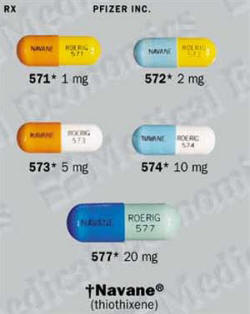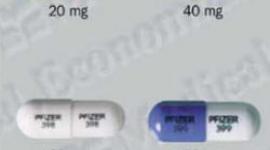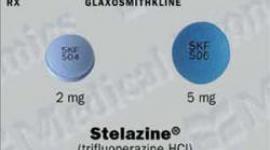Navane (Thiothixene) Patient Information
Find out why Navane (Thiothixene) is prescribed, side effects of Navane, Navane warnings, effects of Navane during pregnancy, more - in plain English.
Generic name: Thiothixene
Brand name: Narvane
Pronounced: NA-vain
Full Navane Prescribing Information
Why is Navane prescribed?
Navane is used in the treatment of schizophrenia (a disruption of thought and the understanding of reality). Researchers theorize that antipsychotic medications such as Navane work by lowering levels of dopamine, a neurotransmitter (or chemical messenger) in the brain. Excessive levels of dopamine are believed to be related to psychotic behavior.
Most important fact about Navane
Navane may cause tardive dyskinesia--a condition marked by involuntary muscle spasms and twitches in the face and body. This condition can be permanent and appears to be most common among the elderly, especially women. Ask your doctor for information about this possible risk.
How should you take Navane?
Navane may be taken in liquid or capsule form. In liquid form, a dropper is supplied.
--If you miss a dose...
Take it as soon as you remember. If it is within 2 hours of your next dose, skip the one you missed and go back to your regular schedule. Do not take 2 doses at once.
--Storage instructions...
Store at room temperature away from heat, light, and moisture. Keep the liquid form from freezing.
What side effects may occur with Navane?
Side effects cannot be anticipated. If any develop or change in intensity, inform your doctor as soon as possible. Only your doctor can determine if it is safe for you to continue taking Navane.
- Side effects of Navane may include: Abnormal muscle rigidity, abnormal secretion of milk, abnormalities in movements and posture, agitation, anemia, blurred vision, breast development in males, chewing movements, constipation, diarrhea, dizziness, drowsiness, dry mouth, excessive thirst, eyeball rotation or state of fixed gaze, fainting, fatigue, fluid accumulation and swelling, headache, high fever, high or low blood sugar, hives, impotence, insomnia, intestinal blockage, involuntary movements of the arms and legs, irregular menstrual periods, itching, light-headedness, loss or increase of appetite, low blood pressure, narrow or dilated pupils of the eye, nasal congestion, nausea, painful muscle spasm, protruding tongue, puckering of mouth, puffing of cheeks, rapid heartbeat, rash, restlessness, salivation, sedation, seizures, sensitivity to light, severe allergic reaction, skin inflammation and peeling, strong reflexes, sweating, swelling of breasts, tremors, twitching in the body, neck, shoulders, and face, visual problems, vomiting, weakness, weight increase, worsening of psychotic symptoms
Why should Navane not be prescribed?
Do not give Navane to comatose individuals. Do not take Navane if you are known to be hypersensitive to it. Also, you should not be using Navane if the activity of your central nervous system is slowed down for any reason--for example, by a sleeping medication, if you have had circulatory system collapse, or if you have an abnormal bone marrow or blood condition.
Special warnings about Navane
Navane may hide symptoms of brain tumor and intestinal obstruction. Your doctor will prescribe Navane cautiously if you have or have ever had a brain tumor, breast cancer, convulsive disorders, the eye condition called glaucoma, intestinal blockage, or heart disease; or if you are exposed to extreme heat or are recovering from alcohol addiction.
This drug may impair your ability to drive a car or operate potentially dangerous machinery. Do not participate in any activities that require full alertness if you are unsure of your ability.
Possible food and drug interactions when taking Navane
If Navane is taken with certain other drugs, the effects of either could be increased, decreased, or altered. It is especially important to check with your doctor before combining Navane with the following:
Antihistamines such as Benadryl Barbiturates such as phenobarbital Drugs that contain atropine, such as Donnatal
Extreme drowsiness and other potentially serious effects can result if Navane is combined with alcohol or other central nervous system depressants such as painkillers, narcotics, or sleeping medications.
Special information if you are pregnant or breastfeeding
If you are pregnant or plan to become pregnant, inform your doctor immediately; pregnant women should use Navane only if clearly needed. Consult your doctor if you are breastfeeding; he or she may have you stop while you are taking Navane.
Recommended dosage for Navane
Dosages of Navane are tailored to the individual. Usually treatment begins with a small dose, which is increased if needed.
ADULTS
For Milder Conditions
 The usual starting dosage is a daily total of 6 milligrams, divided into doses of 2 milligrams and taken 3 times a day. Your doctor may increase the dose to a total of 15 milligrams a day.
The usual starting dosage is a daily total of 6 milligrams, divided into doses of 2 milligrams and taken 3 times a day. Your doctor may increase the dose to a total of 15 milligrams a day.
For More Severe Conditions
The usual starting dosage is a daily total of 10 milligrams, taken in 2 doses of 5 milligrams each. Your doctor may increase this dose to a total of 60 milligrams a day.
Taking more than 60 milligrams a day rarely increases the benefits of Navane.
Some people are able to take Navane once a day. Check with your doctor to see whether you can follow this schedule.
CHILDREN
Navane is not recommended for children younger than 12 years old.
OLDER ADULTS
In general, older adults are prescribed dosages of Navane in the lower ranges. Because older adults may develop low blood pressure while taking Navane, their doctors will monitor them closely. Older adults (especially women) may be more susceptible to such side effects as involuntary muscle spasms and twitches in the face and body. Check with your doctor for more information about these potential risks.
Overdosage of Navane
Any medication taken in excess can have serious consequences. If you suspect an overdose, seek medical help immediately.
Symptoms of Navane overdose may include: Central nervous system depression, coma, difficulty swallowing, dizziness, drowsiness, head tilted to the side, low blood pressure, muscle twitching, rigid muscles, salivation, tremors, walking disturbances, weakness
Full Navane Prescribing Information
Detailed Info on Signs, Symptoms, Causes, Treatments of Schizophrenia
APA Reference
Staff, H.
(2009, January 3). Navane (Thiothixene) Patient Information, HealthyPlace. Retrieved
on 2024, June 20 from https://www.healthyplace.com/other-info/psychiatric-medications/navane-thiothixene-patient-information

